Reflexive Research: Analysis of Leadership Style and Cultural Impact
VerifiedAdded on 2021/04/20
|11
|2935
|80
Report
AI Summary
This report presents a reflexive analysis of the author's leadership experiences within two distinct organizational settings: OPTUS SINGTEL and Universal Music Australia. The author reflects on their career progression, highlighting the development of communication and leadership skills. The report delves into the impact of national and organizational cultures on leadership, exploring concepts like transformational leadership and the challenges of decision-making. The author discusses their leadership style, emphasizing the importance of effective communication, adaptability to cultural norms, and the ability to delegate and motivate team members. The report includes a discussion of a project involving the implementation of a new video conferencing system, illustrating the practical application of leadership principles. Finally, the author outlines areas for improvement, focusing on the importance of embracing organizational values and developing strong leadership qualities, including communication, adaptability, and a focus on team development.
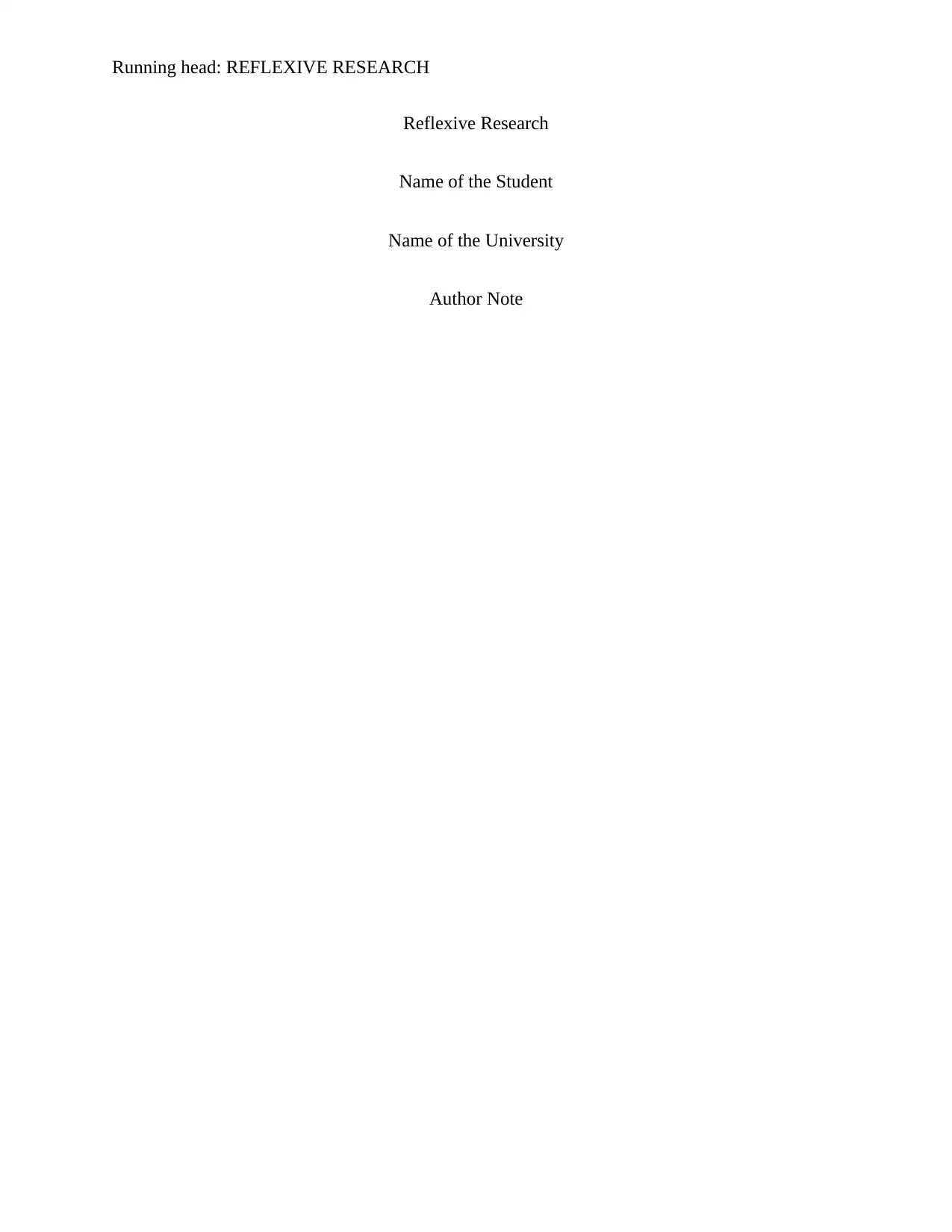
Running head: REFLEXIVE RESEARCH
Reflexive Research
Name of the Student
Name of the University
Author Note
Reflexive Research
Name of the Student
Name of the University
Author Note
Paraphrase This Document
Need a fresh take? Get an instant paraphrase of this document with our AI Paraphraser
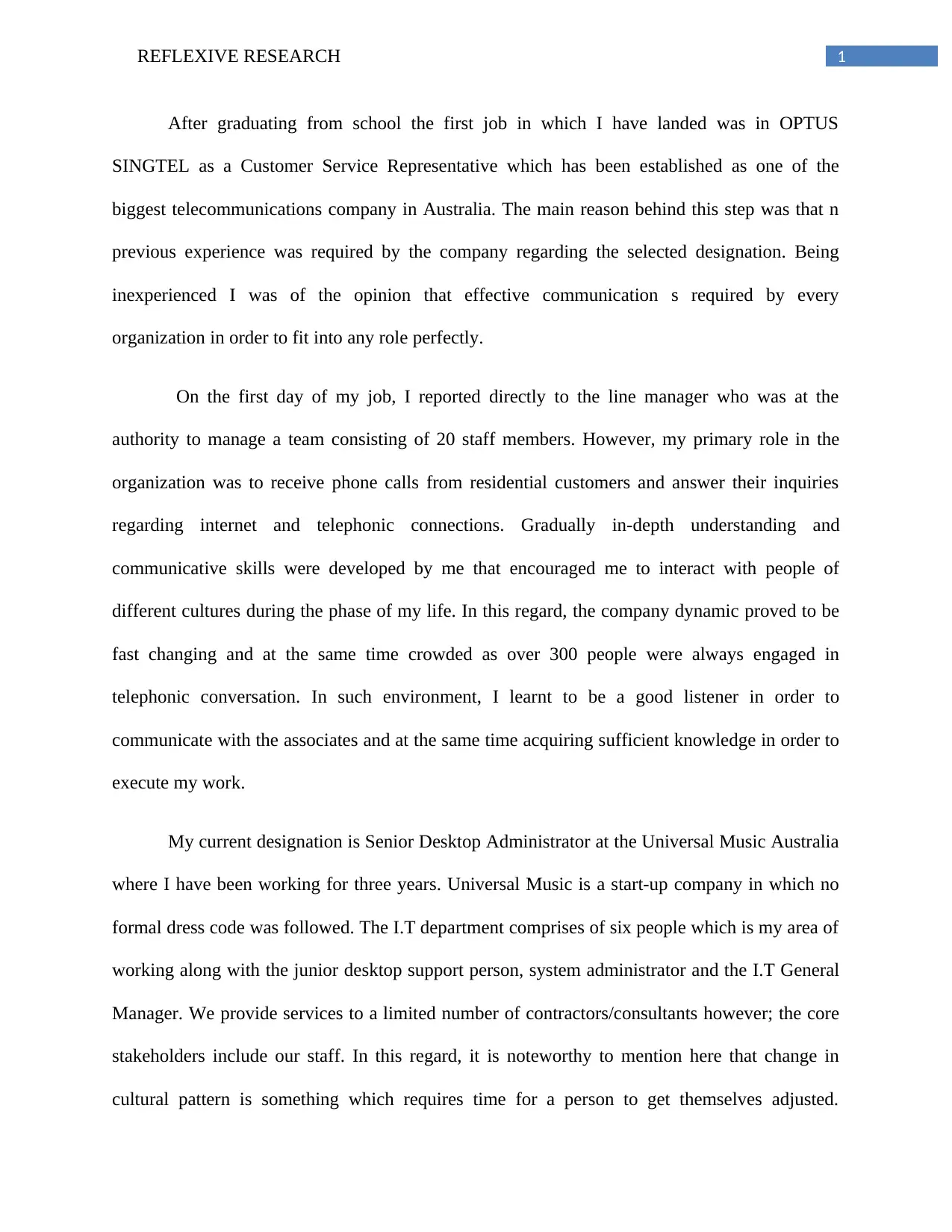
1REFLEXIVE RESEARCH
After graduating from school the first job in which I have landed was in OPTUS
SINGTEL as a Customer Service Representative which has been established as one of the
biggest telecommunications company in Australia. The main reason behind this step was that n
previous experience was required by the company regarding the selected designation. Being
inexperienced I was of the opinion that effective communication s required by every
organization in order to fit into any role perfectly.
On the first day of my job, I reported directly to the line manager who was at the
authority to manage a team consisting of 20 staff members. However, my primary role in the
organization was to receive phone calls from residential customers and answer their inquiries
regarding internet and telephonic connections. Gradually in-depth understanding and
communicative skills were developed by me that encouraged me to interact with people of
different cultures during the phase of my life. In this regard, the company dynamic proved to be
fast changing and at the same time crowded as over 300 people were always engaged in
telephonic conversation. In such environment, I learnt to be a good listener in order to
communicate with the associates and at the same time acquiring sufficient knowledge in order to
execute my work.
My current designation is Senior Desktop Administrator at the Universal Music Australia
where I have been working for three years. Universal Music is a start-up company in which no
formal dress code was followed. The I.T department comprises of six people which is my area of
working along with the junior desktop support person, system administrator and the I.T General
Manager. We provide services to a limited number of contractors/consultants however; the core
stakeholders include our staff. In this regard, it is noteworthy to mention here that change in
cultural pattern is something which requires time for a person to get themselves adjusted.
After graduating from school the first job in which I have landed was in OPTUS
SINGTEL as a Customer Service Representative which has been established as one of the
biggest telecommunications company in Australia. The main reason behind this step was that n
previous experience was required by the company regarding the selected designation. Being
inexperienced I was of the opinion that effective communication s required by every
organization in order to fit into any role perfectly.
On the first day of my job, I reported directly to the line manager who was at the
authority to manage a team consisting of 20 staff members. However, my primary role in the
organization was to receive phone calls from residential customers and answer their inquiries
regarding internet and telephonic connections. Gradually in-depth understanding and
communicative skills were developed by me that encouraged me to interact with people of
different cultures during the phase of my life. In this regard, the company dynamic proved to be
fast changing and at the same time crowded as over 300 people were always engaged in
telephonic conversation. In such environment, I learnt to be a good listener in order to
communicate with the associates and at the same time acquiring sufficient knowledge in order to
execute my work.
My current designation is Senior Desktop Administrator at the Universal Music Australia
where I have been working for three years. Universal Music is a start-up company in which no
formal dress code was followed. The I.T department comprises of six people which is my area of
working along with the junior desktop support person, system administrator and the I.T General
Manager. We provide services to a limited number of contractors/consultants however; the core
stakeholders include our staff. In this regard, it is noteworthy to mention here that change in
cultural pattern is something which requires time for a person to get themselves adjusted.
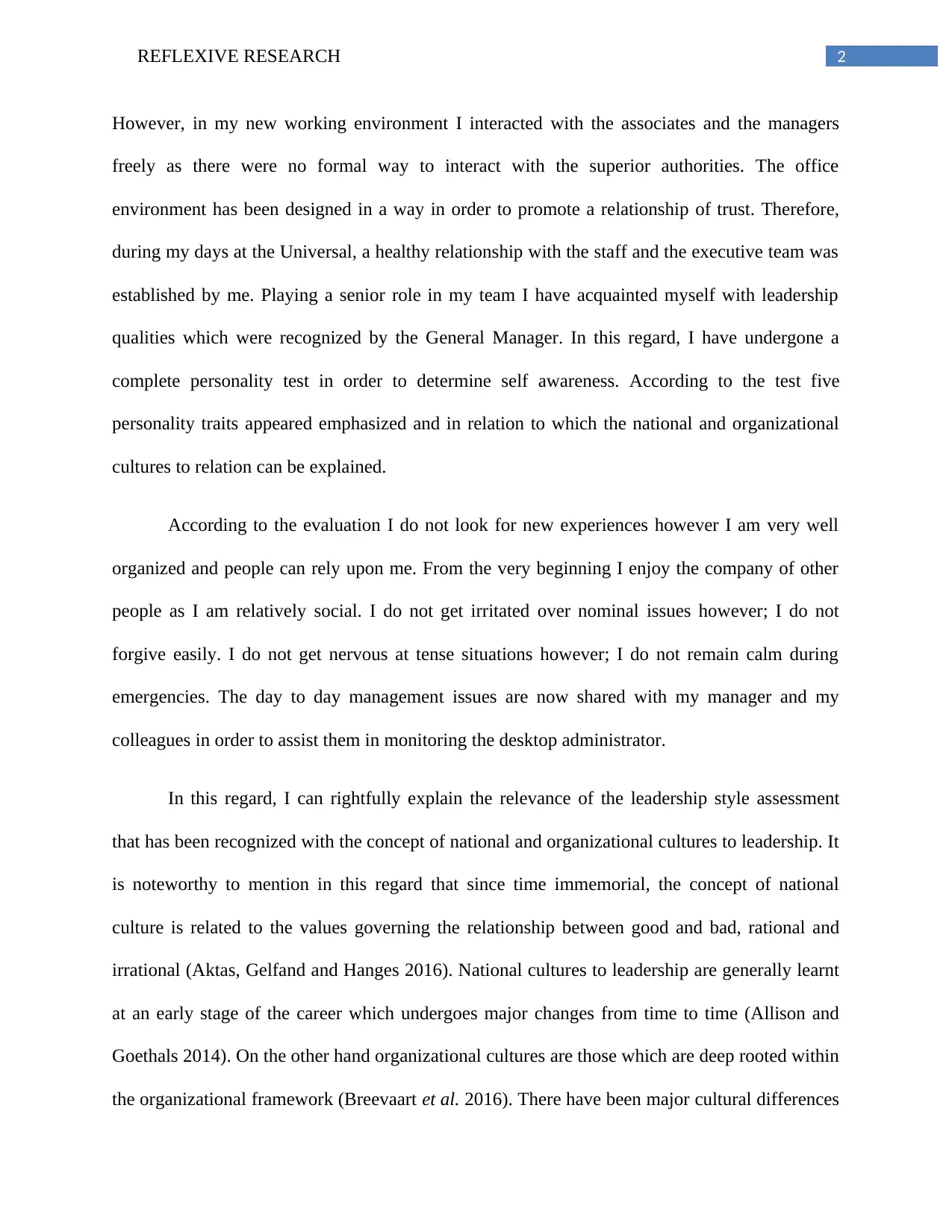
2REFLEXIVE RESEARCH
However, in my new working environment I interacted with the associates and the managers
freely as there were no formal way to interact with the superior authorities. The office
environment has been designed in a way in order to promote a relationship of trust. Therefore,
during my days at the Universal, a healthy relationship with the staff and the executive team was
established by me. Playing a senior role in my team I have acquainted myself with leadership
qualities which were recognized by the General Manager. In this regard, I have undergone a
complete personality test in order to determine self awareness. According to the test five
personality traits appeared emphasized and in relation to which the national and organizational
cultures to relation can be explained.
According to the evaluation I do not look for new experiences however I am very well
organized and people can rely upon me. From the very beginning I enjoy the company of other
people as I am relatively social. I do not get irritated over nominal issues however; I do not
forgive easily. I do not get nervous at tense situations however; I do not remain calm during
emergencies. The day to day management issues are now shared with my manager and my
colleagues in order to assist them in monitoring the desktop administrator.
In this regard, I can rightfully explain the relevance of the leadership style assessment
that has been recognized with the concept of national and organizational cultures to leadership. It
is noteworthy to mention in this regard that since time immemorial, the concept of national
culture is related to the values governing the relationship between good and bad, rational and
irrational (Aktas, Gelfand and Hanges 2016). National cultures to leadership are generally learnt
at an early stage of the career which undergoes major changes from time to time (Allison and
Goethals 2014). On the other hand organizational cultures are those which are deep rooted within
the organizational framework (Breevaart et al. 2016). There have been major cultural differences
However, in my new working environment I interacted with the associates and the managers
freely as there were no formal way to interact with the superior authorities. The office
environment has been designed in a way in order to promote a relationship of trust. Therefore,
during my days at the Universal, a healthy relationship with the staff and the executive team was
established by me. Playing a senior role in my team I have acquainted myself with leadership
qualities which were recognized by the General Manager. In this regard, I have undergone a
complete personality test in order to determine self awareness. According to the test five
personality traits appeared emphasized and in relation to which the national and organizational
cultures to relation can be explained.
According to the evaluation I do not look for new experiences however I am very well
organized and people can rely upon me. From the very beginning I enjoy the company of other
people as I am relatively social. I do not get irritated over nominal issues however; I do not
forgive easily. I do not get nervous at tense situations however; I do not remain calm during
emergencies. The day to day management issues are now shared with my manager and my
colleagues in order to assist them in monitoring the desktop administrator.
In this regard, I can rightfully explain the relevance of the leadership style assessment
that has been recognized with the concept of national and organizational cultures to leadership. It
is noteworthy to mention in this regard that since time immemorial, the concept of national
culture is related to the values governing the relationship between good and bad, rational and
irrational (Aktas, Gelfand and Hanges 2016). National cultures to leadership are generally learnt
at an early stage of the career which undergoes major changes from time to time (Allison and
Goethals 2014). On the other hand organizational cultures are those which are deep rooted within
the organizational framework (Breevaart et al. 2016). There have been major cultural differences
⊘ This is a preview!⊘
Do you want full access?
Subscribe today to unlock all pages.

Trusted by 1+ million students worldwide
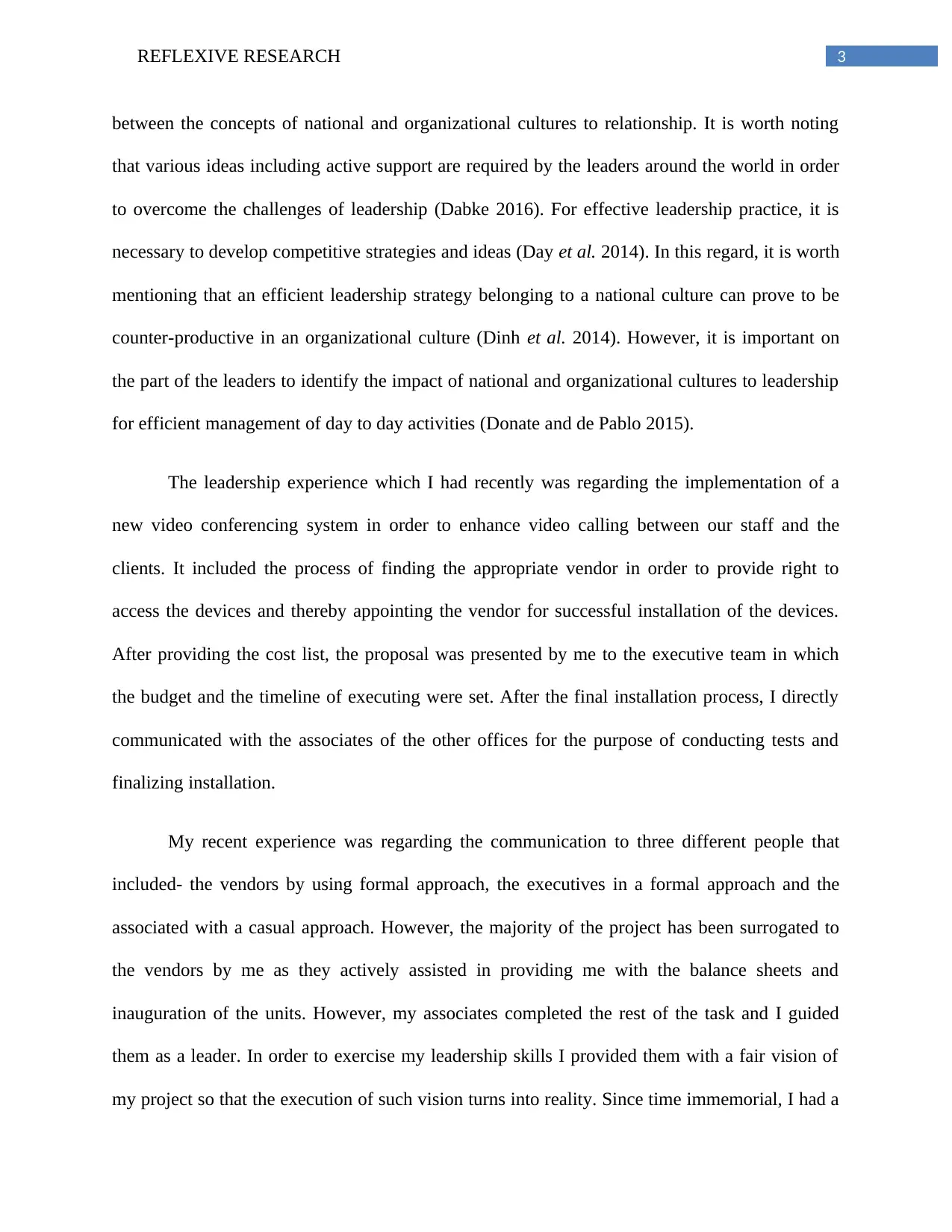
3REFLEXIVE RESEARCH
between the concepts of national and organizational cultures to relationship. It is worth noting
that various ideas including active support are required by the leaders around the world in order
to overcome the challenges of leadership (Dabke 2016). For effective leadership practice, it is
necessary to develop competitive strategies and ideas (Day et al. 2014). In this regard, it is worth
mentioning that an efficient leadership strategy belonging to a national culture can prove to be
counter-productive in an organizational culture (Dinh et al. 2014). However, it is important on
the part of the leaders to identify the impact of national and organizational cultures to leadership
for efficient management of day to day activities (Donate and de Pablo 2015).
The leadership experience which I had recently was regarding the implementation of a
new video conferencing system in order to enhance video calling between our staff and the
clients. It included the process of finding the appropriate vendor in order to provide right to
access the devices and thereby appointing the vendor for successful installation of the devices.
After providing the cost list, the proposal was presented by me to the executive team in which
the budget and the timeline of executing were set. After the final installation process, I directly
communicated with the associates of the other offices for the purpose of conducting tests and
finalizing installation.
My recent experience was regarding the communication to three different people that
included- the vendors by using formal approach, the executives in a formal approach and the
associated with a casual approach. However, the majority of the project has been surrogated to
the vendors by me as they actively assisted in providing me with the balance sheets and
inauguration of the units. However, my associates completed the rest of the task and I guided
them as a leader. In order to exercise my leadership skills I provided them with a fair vision of
my project so that the execution of such vision turns into reality. Since time immemorial, I had a
between the concepts of national and organizational cultures to relationship. It is worth noting
that various ideas including active support are required by the leaders around the world in order
to overcome the challenges of leadership (Dabke 2016). For effective leadership practice, it is
necessary to develop competitive strategies and ideas (Day et al. 2014). In this regard, it is worth
mentioning that an efficient leadership strategy belonging to a national culture can prove to be
counter-productive in an organizational culture (Dinh et al. 2014). However, it is important on
the part of the leaders to identify the impact of national and organizational cultures to leadership
for efficient management of day to day activities (Donate and de Pablo 2015).
The leadership experience which I had recently was regarding the implementation of a
new video conferencing system in order to enhance video calling between our staff and the
clients. It included the process of finding the appropriate vendor in order to provide right to
access the devices and thereby appointing the vendor for successful installation of the devices.
After providing the cost list, the proposal was presented by me to the executive team in which
the budget and the timeline of executing were set. After the final installation process, I directly
communicated with the associates of the other offices for the purpose of conducting tests and
finalizing installation.
My recent experience was regarding the communication to three different people that
included- the vendors by using formal approach, the executives in a formal approach and the
associated with a casual approach. However, the majority of the project has been surrogated to
the vendors by me as they actively assisted in providing me with the balance sheets and
inauguration of the units. However, my associates completed the rest of the task and I guided
them as a leader. In order to exercise my leadership skills I provided them with a fair vision of
my project so that the execution of such vision turns into reality. Since time immemorial, I had a
Paraphrase This Document
Need a fresh take? Get an instant paraphrase of this document with our AI Paraphraser
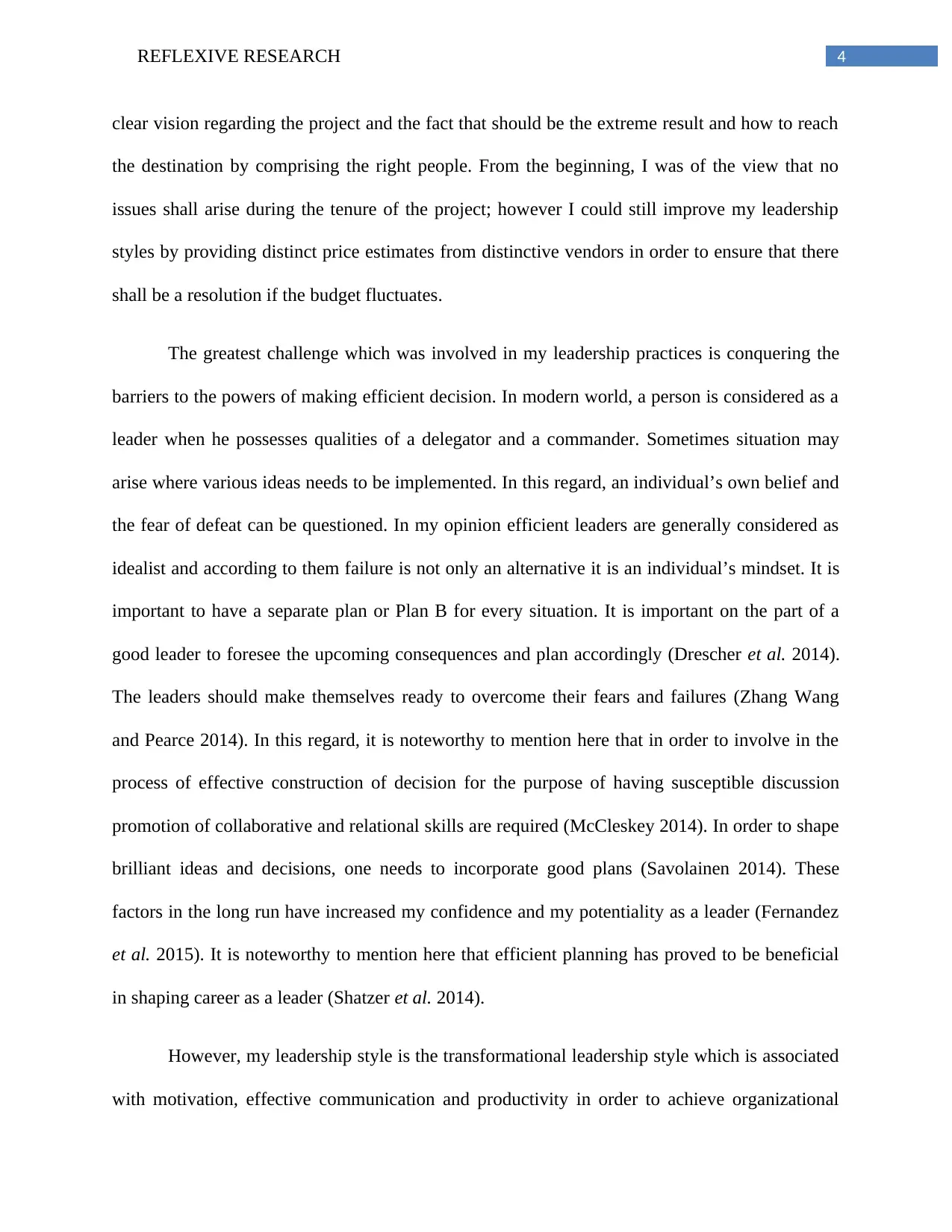
4REFLEXIVE RESEARCH
clear vision regarding the project and the fact that should be the extreme result and how to reach
the destination by comprising the right people. From the beginning, I was of the view that no
issues shall arise during the tenure of the project; however I could still improve my leadership
styles by providing distinct price estimates from distinctive vendors in order to ensure that there
shall be a resolution if the budget fluctuates.
The greatest challenge which was involved in my leadership practices is conquering the
barriers to the powers of making efficient decision. In modern world, a person is considered as a
leader when he possesses qualities of a delegator and a commander. Sometimes situation may
arise where various ideas needs to be implemented. In this regard, an individual’s own belief and
the fear of defeat can be questioned. In my opinion efficient leaders are generally considered as
idealist and according to them failure is not only an alternative it is an individual’s mindset. It is
important to have a separate plan or Plan B for every situation. It is important on the part of a
good leader to foresee the upcoming consequences and plan accordingly (Drescher et al. 2014).
The leaders should make themselves ready to overcome their fears and failures (Zhang Wang
and Pearce 2014). In this regard, it is noteworthy to mention here that in order to involve in the
process of effective construction of decision for the purpose of having susceptible discussion
promotion of collaborative and relational skills are required (McCleskey 2014). In order to shape
brilliant ideas and decisions, one needs to incorporate good plans (Savolainen 2014). These
factors in the long run have increased my confidence and my potentiality as a leader (Fernandez
et al. 2015). It is noteworthy to mention here that efficient planning has proved to be beneficial
in shaping career as a leader (Shatzer et al. 2014).
However, my leadership style is the transformational leadership style which is associated
with motivation, effective communication and productivity in order to achieve organizational
clear vision regarding the project and the fact that should be the extreme result and how to reach
the destination by comprising the right people. From the beginning, I was of the view that no
issues shall arise during the tenure of the project; however I could still improve my leadership
styles by providing distinct price estimates from distinctive vendors in order to ensure that there
shall be a resolution if the budget fluctuates.
The greatest challenge which was involved in my leadership practices is conquering the
barriers to the powers of making efficient decision. In modern world, a person is considered as a
leader when he possesses qualities of a delegator and a commander. Sometimes situation may
arise where various ideas needs to be implemented. In this regard, an individual’s own belief and
the fear of defeat can be questioned. In my opinion efficient leaders are generally considered as
idealist and according to them failure is not only an alternative it is an individual’s mindset. It is
important to have a separate plan or Plan B for every situation. It is important on the part of a
good leader to foresee the upcoming consequences and plan accordingly (Drescher et al. 2014).
The leaders should make themselves ready to overcome their fears and failures (Zhang Wang
and Pearce 2014). In this regard, it is noteworthy to mention here that in order to involve in the
process of effective construction of decision for the purpose of having susceptible discussion
promotion of collaborative and relational skills are required (McCleskey 2014). In order to shape
brilliant ideas and decisions, one needs to incorporate good plans (Savolainen 2014). These
factors in the long run have increased my confidence and my potentiality as a leader (Fernandez
et al. 2015). It is noteworthy to mention here that efficient planning has proved to be beneficial
in shaping career as a leader (Shatzer et al. 2014).
However, my leadership style is the transformational leadership style which is associated
with motivation, effective communication and productivity in order to achieve organizational
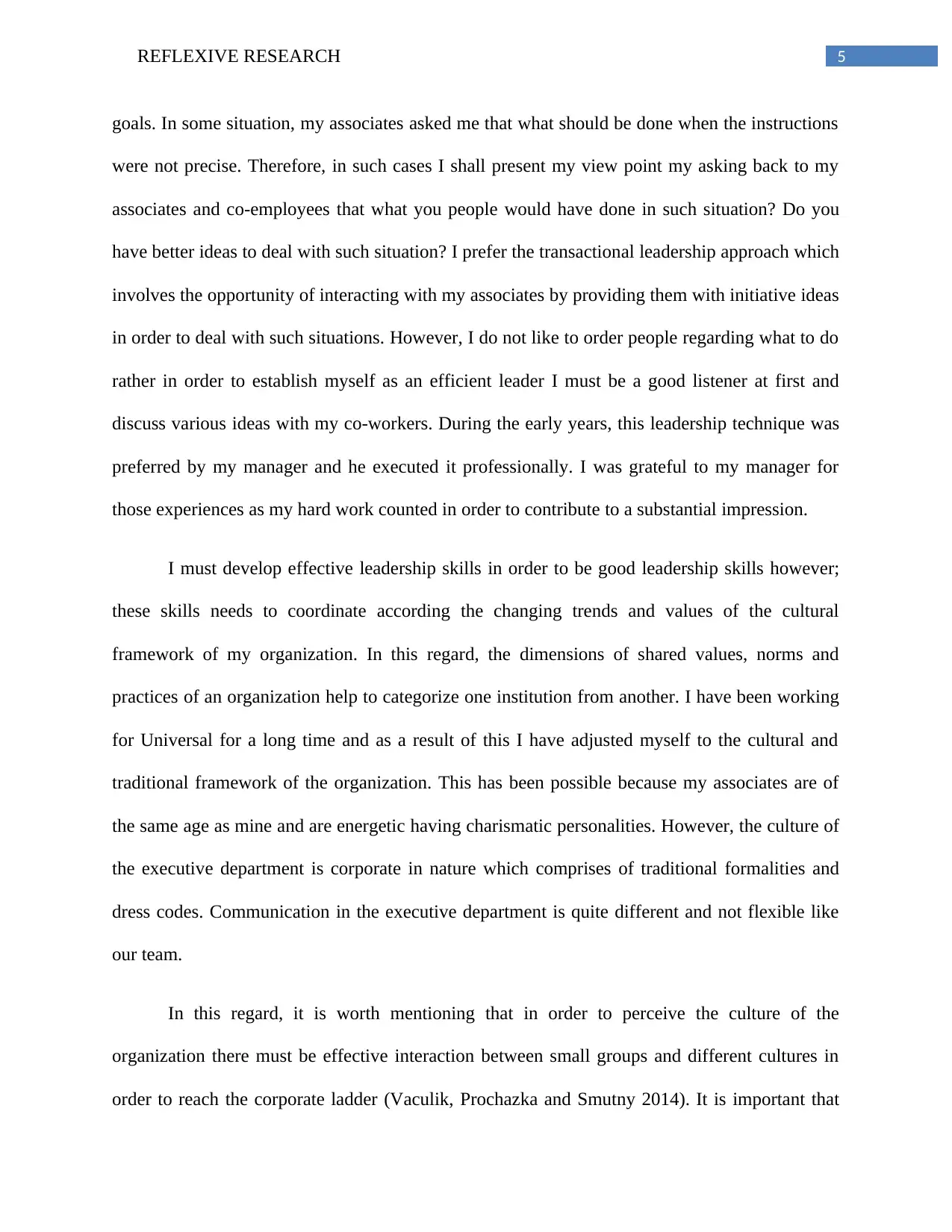
5REFLEXIVE RESEARCH
goals. In some situation, my associates asked me that what should be done when the instructions
were not precise. Therefore, in such cases I shall present my view point my asking back to my
associates and co-employees that what you people would have done in such situation? Do you
have better ideas to deal with such situation? I prefer the transactional leadership approach which
involves the opportunity of interacting with my associates by providing them with initiative ideas
in order to deal with such situations. However, I do not like to order people regarding what to do
rather in order to establish myself as an efficient leader I must be a good listener at first and
discuss various ideas with my co-workers. During the early years, this leadership technique was
preferred by my manager and he executed it professionally. I was grateful to my manager for
those experiences as my hard work counted in order to contribute to a substantial impression.
I must develop effective leadership skills in order to be good leadership skills however;
these skills needs to coordinate according the changing trends and values of the cultural
framework of my organization. In this regard, the dimensions of shared values, norms and
practices of an organization help to categorize one institution from another. I have been working
for Universal for a long time and as a result of this I have adjusted myself to the cultural and
traditional framework of the organization. This has been possible because my associates are of
the same age as mine and are energetic having charismatic personalities. However, the culture of
the executive department is corporate in nature which comprises of traditional formalities and
dress codes. Communication in the executive department is quite different and not flexible like
our team.
In this regard, it is worth mentioning that in order to perceive the culture of the
organization there must be effective interaction between small groups and different cultures in
order to reach the corporate ladder (Vaculik, Prochazka and Smutny 2014). It is important that
goals. In some situation, my associates asked me that what should be done when the instructions
were not precise. Therefore, in such cases I shall present my view point my asking back to my
associates and co-employees that what you people would have done in such situation? Do you
have better ideas to deal with such situation? I prefer the transactional leadership approach which
involves the opportunity of interacting with my associates by providing them with initiative ideas
in order to deal with such situations. However, I do not like to order people regarding what to do
rather in order to establish myself as an efficient leader I must be a good listener at first and
discuss various ideas with my co-workers. During the early years, this leadership technique was
preferred by my manager and he executed it professionally. I was grateful to my manager for
those experiences as my hard work counted in order to contribute to a substantial impression.
I must develop effective leadership skills in order to be good leadership skills however;
these skills needs to coordinate according the changing trends and values of the cultural
framework of my organization. In this regard, the dimensions of shared values, norms and
practices of an organization help to categorize one institution from another. I have been working
for Universal for a long time and as a result of this I have adjusted myself to the cultural and
traditional framework of the organization. This has been possible because my associates are of
the same age as mine and are energetic having charismatic personalities. However, the culture of
the executive department is corporate in nature which comprises of traditional formalities and
dress codes. Communication in the executive department is quite different and not flexible like
our team.
In this regard, it is worth mentioning that in order to perceive the culture of the
organization there must be effective interaction between small groups and different cultures in
order to reach the corporate ladder (Vaculik, Prochazka and Smutny 2014). It is important that
⊘ This is a preview!⊘
Do you want full access?
Subscribe today to unlock all pages.

Trusted by 1+ million students worldwide
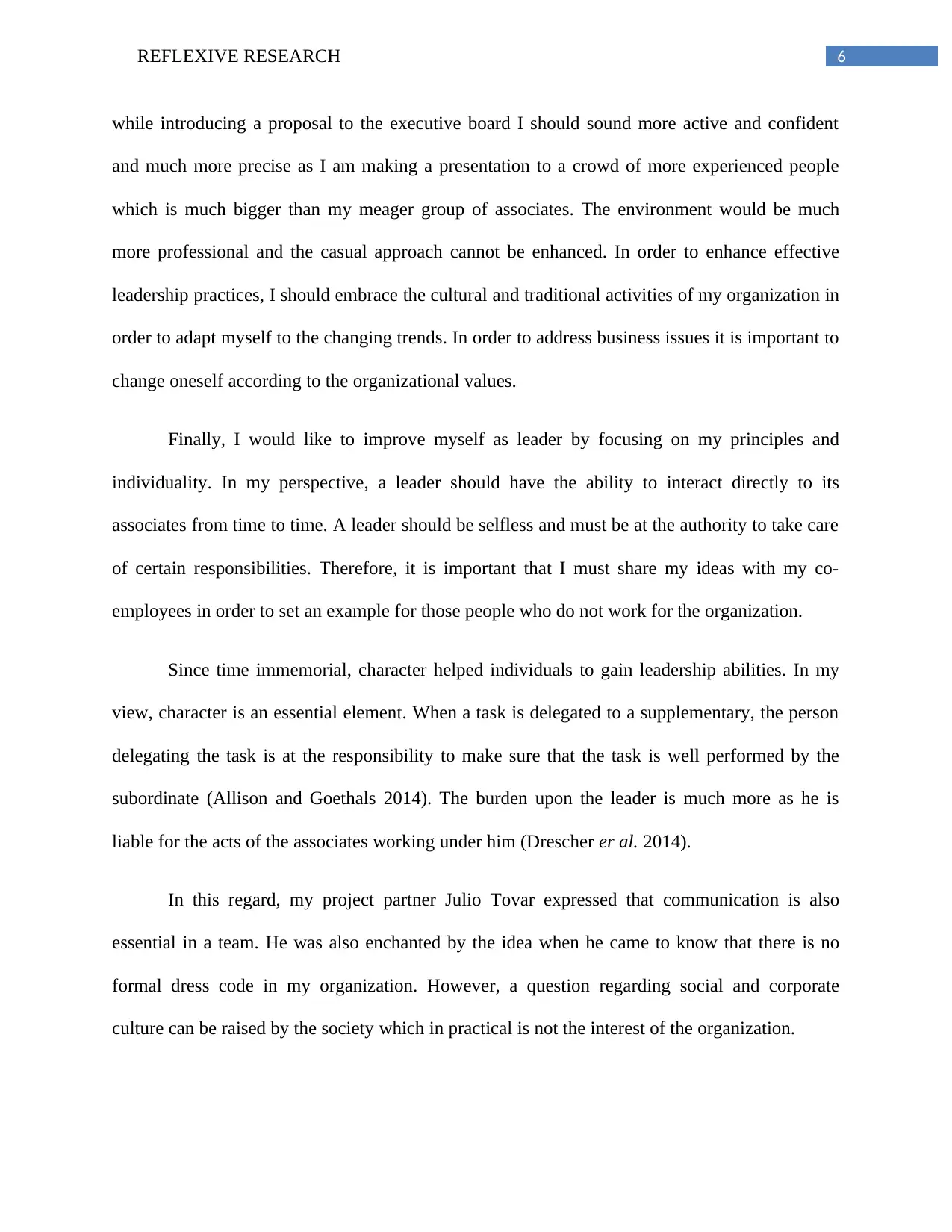
6REFLEXIVE RESEARCH
while introducing a proposal to the executive board I should sound more active and confident
and much more precise as I am making a presentation to a crowd of more experienced people
which is much bigger than my meager group of associates. The environment would be much
more professional and the casual approach cannot be enhanced. In order to enhance effective
leadership practices, I should embrace the cultural and traditional activities of my organization in
order to adapt myself to the changing trends. In order to address business issues it is important to
change oneself according to the organizational values.
Finally, I would like to improve myself as leader by focusing on my principles and
individuality. In my perspective, a leader should have the ability to interact directly to its
associates from time to time. A leader should be selfless and must be at the authority to take care
of certain responsibilities. Therefore, it is important that I must share my ideas with my co-
employees in order to set an example for those people who do not work for the organization.
Since time immemorial, character helped individuals to gain leadership abilities. In my
view, character is an essential element. When a task is delegated to a supplementary, the person
delegating the task is at the responsibility to make sure that the task is well performed by the
subordinate (Allison and Goethals 2014). The burden upon the leader is much more as he is
liable for the acts of the associates working under him (Drescher er al. 2014).
In this regard, my project partner Julio Tovar expressed that communication is also
essential in a team. He was also enchanted by the idea when he came to know that there is no
formal dress code in my organization. However, a question regarding social and corporate
culture can be raised by the society which in practical is not the interest of the organization.
while introducing a proposal to the executive board I should sound more active and confident
and much more precise as I am making a presentation to a crowd of more experienced people
which is much bigger than my meager group of associates. The environment would be much
more professional and the casual approach cannot be enhanced. In order to enhance effective
leadership practices, I should embrace the cultural and traditional activities of my organization in
order to adapt myself to the changing trends. In order to address business issues it is important to
change oneself according to the organizational values.
Finally, I would like to improve myself as leader by focusing on my principles and
individuality. In my perspective, a leader should have the ability to interact directly to its
associates from time to time. A leader should be selfless and must be at the authority to take care
of certain responsibilities. Therefore, it is important that I must share my ideas with my co-
employees in order to set an example for those people who do not work for the organization.
Since time immemorial, character helped individuals to gain leadership abilities. In my
view, character is an essential element. When a task is delegated to a supplementary, the person
delegating the task is at the responsibility to make sure that the task is well performed by the
subordinate (Allison and Goethals 2014). The burden upon the leader is much more as he is
liable for the acts of the associates working under him (Drescher er al. 2014).
In this regard, my project partner Julio Tovar expressed that communication is also
essential in a team. He was also enchanted by the idea when he came to know that there is no
formal dress code in my organization. However, a question regarding social and corporate
culture can be raised by the society which in practical is not the interest of the organization.
Paraphrase This Document
Need a fresh take? Get an instant paraphrase of this document with our AI Paraphraser
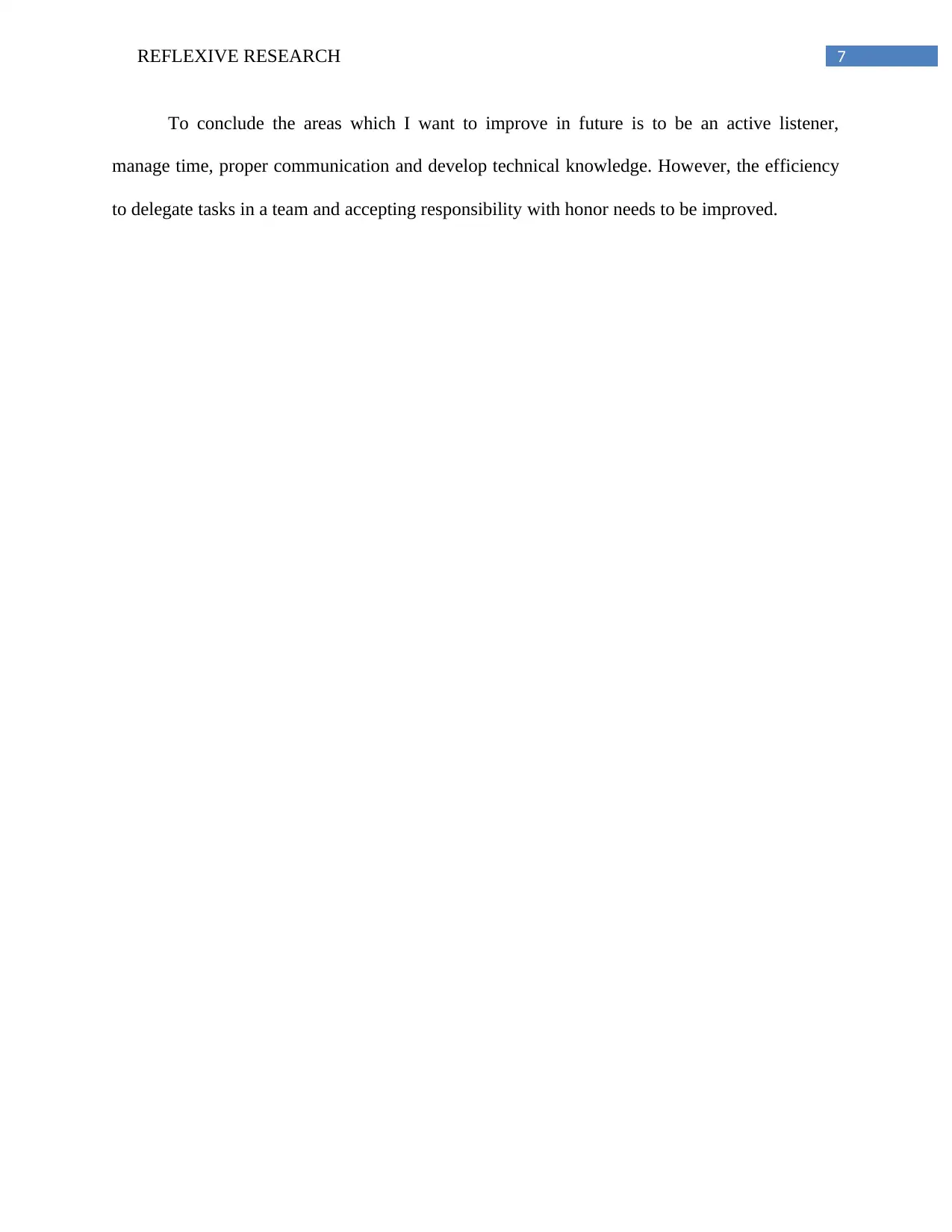
7REFLEXIVE RESEARCH
To conclude the areas which I want to improve in future is to be an active listener,
manage time, proper communication and develop technical knowledge. However, the efficiency
to delegate tasks in a team and accepting responsibility with honor needs to be improved.
To conclude the areas which I want to improve in future is to be an active listener,
manage time, proper communication and develop technical knowledge. However, the efficiency
to delegate tasks in a team and accepting responsibility with honor needs to be improved.
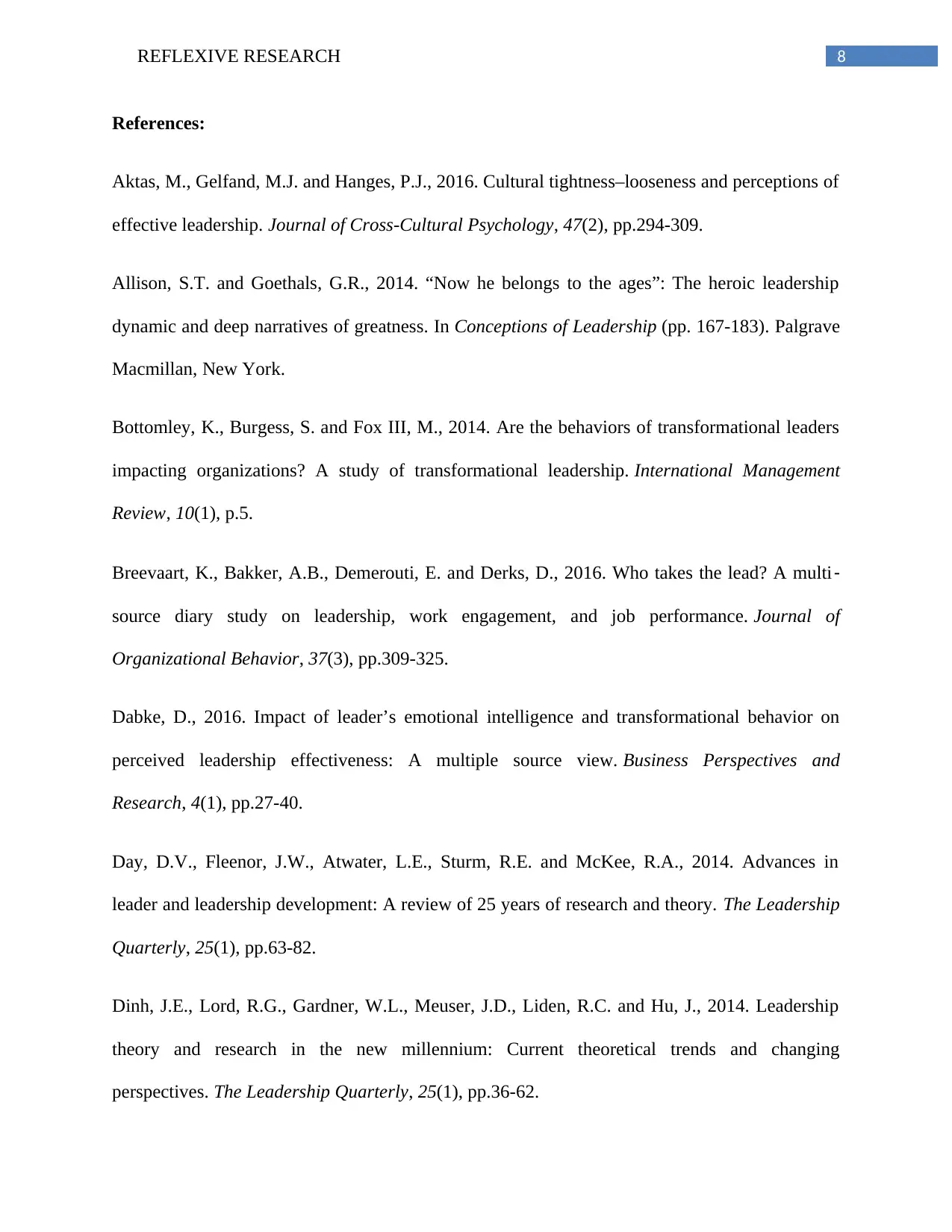
8REFLEXIVE RESEARCH
References:
Aktas, M., Gelfand, M.J. and Hanges, P.J., 2016. Cultural tightness–looseness and perceptions of
effective leadership. Journal of Cross-Cultural Psychology, 47(2), pp.294-309.
Allison, S.T. and Goethals, G.R., 2014. “Now he belongs to the ages”: The heroic leadership
dynamic and deep narratives of greatness. In Conceptions of Leadership (pp. 167-183). Palgrave
Macmillan, New York.
Bottomley, K., Burgess, S. and Fox III, M., 2014. Are the behaviors of transformational leaders
impacting organizations? A study of transformational leadership. International Management
Review, 10(1), p.5.
Breevaart, K., Bakker, A.B., Demerouti, E. and Derks, D., 2016. Who takes the lead? A multi‐
source diary study on leadership, work engagement, and job performance. Journal of
Organizational Behavior, 37(3), pp.309-325.
Dabke, D., 2016. Impact of leader’s emotional intelligence and transformational behavior on
perceived leadership effectiveness: A multiple source view. Business Perspectives and
Research, 4(1), pp.27-40.
Day, D.V., Fleenor, J.W., Atwater, L.E., Sturm, R.E. and McKee, R.A., 2014. Advances in
leader and leadership development: A review of 25 years of research and theory. The Leadership
Quarterly, 25(1), pp.63-82.
Dinh, J.E., Lord, R.G., Gardner, W.L., Meuser, J.D., Liden, R.C. and Hu, J., 2014. Leadership
theory and research in the new millennium: Current theoretical trends and changing
perspectives. The Leadership Quarterly, 25(1), pp.36-62.
References:
Aktas, M., Gelfand, M.J. and Hanges, P.J., 2016. Cultural tightness–looseness and perceptions of
effective leadership. Journal of Cross-Cultural Psychology, 47(2), pp.294-309.
Allison, S.T. and Goethals, G.R., 2014. “Now he belongs to the ages”: The heroic leadership
dynamic and deep narratives of greatness. In Conceptions of Leadership (pp. 167-183). Palgrave
Macmillan, New York.
Bottomley, K., Burgess, S. and Fox III, M., 2014. Are the behaviors of transformational leaders
impacting organizations? A study of transformational leadership. International Management
Review, 10(1), p.5.
Breevaart, K., Bakker, A.B., Demerouti, E. and Derks, D., 2016. Who takes the lead? A multi‐
source diary study on leadership, work engagement, and job performance. Journal of
Organizational Behavior, 37(3), pp.309-325.
Dabke, D., 2016. Impact of leader’s emotional intelligence and transformational behavior on
perceived leadership effectiveness: A multiple source view. Business Perspectives and
Research, 4(1), pp.27-40.
Day, D.V., Fleenor, J.W., Atwater, L.E., Sturm, R.E. and McKee, R.A., 2014. Advances in
leader and leadership development: A review of 25 years of research and theory. The Leadership
Quarterly, 25(1), pp.63-82.
Dinh, J.E., Lord, R.G., Gardner, W.L., Meuser, J.D., Liden, R.C. and Hu, J., 2014. Leadership
theory and research in the new millennium: Current theoretical trends and changing
perspectives. The Leadership Quarterly, 25(1), pp.36-62.
⊘ This is a preview!⊘
Do you want full access?
Subscribe today to unlock all pages.

Trusted by 1+ million students worldwide
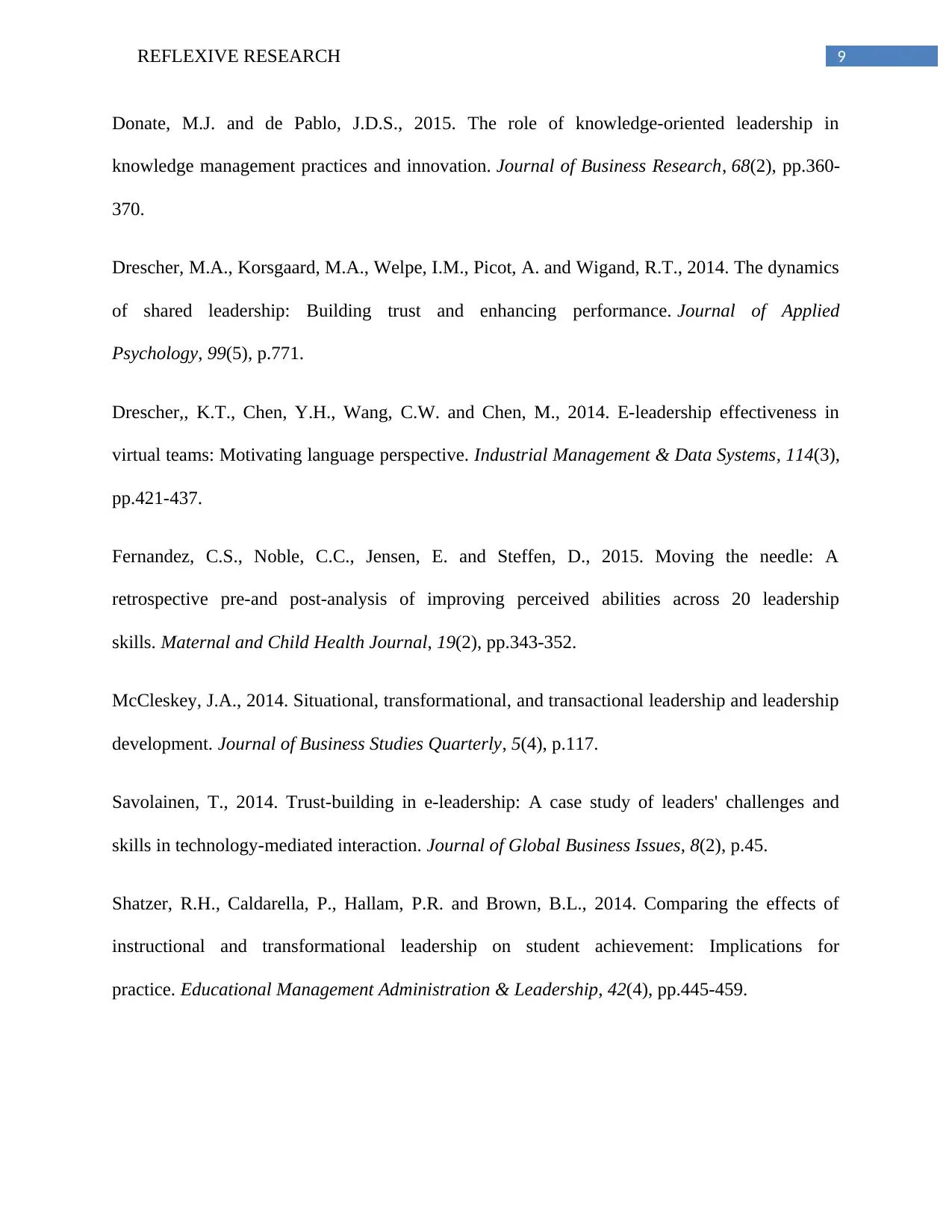
9REFLEXIVE RESEARCH
Donate, M.J. and de Pablo, J.D.S., 2015. The role of knowledge-oriented leadership in
knowledge management practices and innovation. Journal of Business Research, 68(2), pp.360-
370.
Drescher, M.A., Korsgaard, M.A., Welpe, I.M., Picot, A. and Wigand, R.T., 2014. The dynamics
of shared leadership: Building trust and enhancing performance. Journal of Applied
Psychology, 99(5), p.771.
Drescher,, K.T., Chen, Y.H., Wang, C.W. and Chen, M., 2014. E-leadership effectiveness in
virtual teams: Motivating language perspective. Industrial Management & Data Systems, 114(3),
pp.421-437.
Fernandez, C.S., Noble, C.C., Jensen, E. and Steffen, D., 2015. Moving the needle: A
retrospective pre-and post-analysis of improving perceived abilities across 20 leadership
skills. Maternal and Child Health Journal, 19(2), pp.343-352.
McCleskey, J.A., 2014. Situational, transformational, and transactional leadership and leadership
development. Journal of Business Studies Quarterly, 5(4), p.117.
Savolainen, T., 2014. Trust-building in e-leadership: A case study of leaders' challenges and
skills in technology-mediated interaction. Journal of Global Business Issues, 8(2), p.45.
Shatzer, R.H., Caldarella, P., Hallam, P.R. and Brown, B.L., 2014. Comparing the effects of
instructional and transformational leadership on student achievement: Implications for
practice. Educational Management Administration & Leadership, 42(4), pp.445-459.
Donate, M.J. and de Pablo, J.D.S., 2015. The role of knowledge-oriented leadership in
knowledge management practices and innovation. Journal of Business Research, 68(2), pp.360-
370.
Drescher, M.A., Korsgaard, M.A., Welpe, I.M., Picot, A. and Wigand, R.T., 2014. The dynamics
of shared leadership: Building trust and enhancing performance. Journal of Applied
Psychology, 99(5), p.771.
Drescher,, K.T., Chen, Y.H., Wang, C.W. and Chen, M., 2014. E-leadership effectiveness in
virtual teams: Motivating language perspective. Industrial Management & Data Systems, 114(3),
pp.421-437.
Fernandez, C.S., Noble, C.C., Jensen, E. and Steffen, D., 2015. Moving the needle: A
retrospective pre-and post-analysis of improving perceived abilities across 20 leadership
skills. Maternal and Child Health Journal, 19(2), pp.343-352.
McCleskey, J.A., 2014. Situational, transformational, and transactional leadership and leadership
development. Journal of Business Studies Quarterly, 5(4), p.117.
Savolainen, T., 2014. Trust-building in e-leadership: A case study of leaders' challenges and
skills in technology-mediated interaction. Journal of Global Business Issues, 8(2), p.45.
Shatzer, R.H., Caldarella, P., Hallam, P.R. and Brown, B.L., 2014. Comparing the effects of
instructional and transformational leadership on student achievement: Implications for
practice. Educational Management Administration & Leadership, 42(4), pp.445-459.
Paraphrase This Document
Need a fresh take? Get an instant paraphrase of this document with our AI Paraphraser
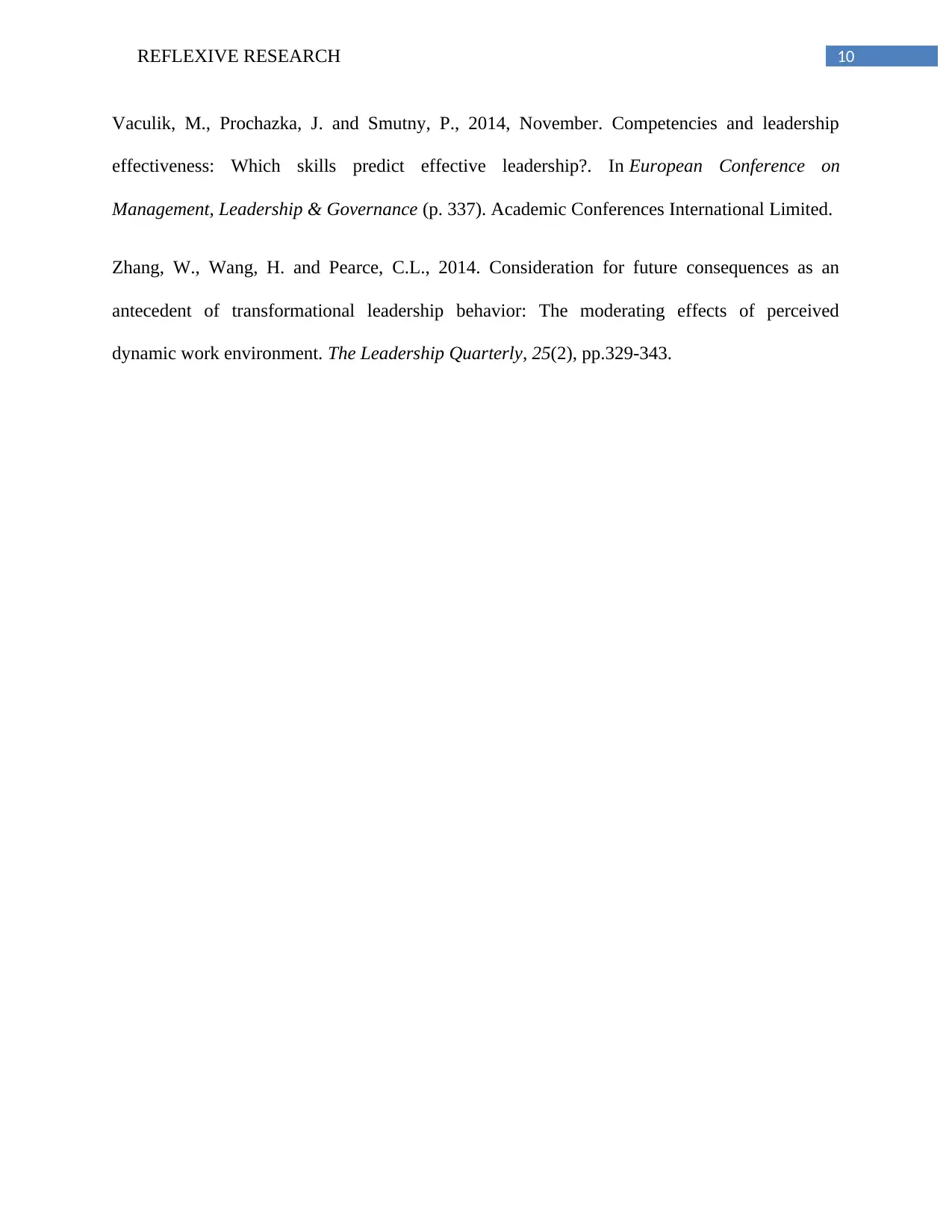
10REFLEXIVE RESEARCH
Vaculik, M., Prochazka, J. and Smutny, P., 2014, November. Competencies and leadership
effectiveness: Which skills predict effective leadership?. In European Conference on
Management, Leadership & Governance (p. 337). Academic Conferences International Limited.
Zhang, W., Wang, H. and Pearce, C.L., 2014. Consideration for future consequences as an
antecedent of transformational leadership behavior: The moderating effects of perceived
dynamic work environment. The Leadership Quarterly, 25(2), pp.329-343.
Vaculik, M., Prochazka, J. and Smutny, P., 2014, November. Competencies and leadership
effectiveness: Which skills predict effective leadership?. In European Conference on
Management, Leadership & Governance (p. 337). Academic Conferences International Limited.
Zhang, W., Wang, H. and Pearce, C.L., 2014. Consideration for future consequences as an
antecedent of transformational leadership behavior: The moderating effects of perceived
dynamic work environment. The Leadership Quarterly, 25(2), pp.329-343.
1 out of 11
Related Documents
Your All-in-One AI-Powered Toolkit for Academic Success.
+13062052269
info@desklib.com
Available 24*7 on WhatsApp / Email
![[object Object]](/_next/static/media/star-bottom.7253800d.svg)
Unlock your academic potential
Copyright © 2020–2026 A2Z Services. All Rights Reserved. Developed and managed by ZUCOL.





